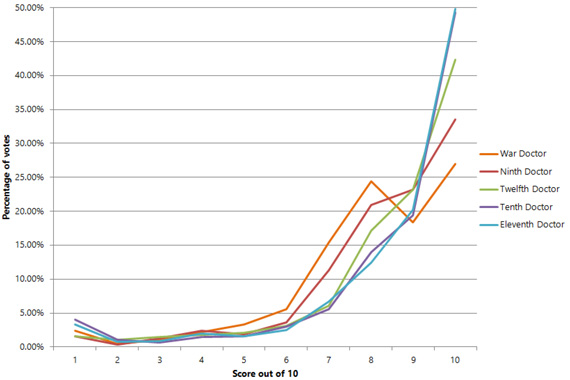Doctor of the Decade: A Numbery-Wumbery Breakdown
Guest contributor Joshua Yetman gives a statistical breakdown of the results.

The point of these articles – and other articles in the “Numbery-Wumbery” range – is to present a clear and informed analysis of the results of these polls. This article seeks to explore, in gratuitous detail where possible, the results of the recent “Doctor of the Decade” poll and its associated face-offs, where the five Doctors of the revival were scored on their own merits and competed against each other in order to determine which incarnation comes up top after all these years.
(1) The average Doctor scores
 The average score of the five revival Doctors were originally given on the main results article for this poll, but are repeated below:
The average score of the five revival Doctors were originally given on the main results article for this poll, but are repeated below:
- War Doctor – 8.03
- Ninth Doctor – 8.37
- Twelfth Doctor – 8.57
- Tenth Doctor – 8.58
- Eleventh Doctor – 8.64
It doesn’t take a degree in statistics to see that all five Doctors performed exceptionally indeed on average, with all of them – even the War Doctor, with his single appearance (to date) – managing to attain an average score of 8/10 or above. Given that these polls attract thousands of votes, these results are a testament to the sheer perceived strength of every Doctor we’ve had in the past 10 years. Even if your favourite Doctor didn’t come up top, he’s still a winner, in any sense, though Eleven is the statistical victor.
Furthermore, some interesting results crop up when comparing these Doctor averages to the averages of each Doctor’s era, calculated in the poll series last month. These averages are repeated below (the War Doctor is omitted from this list, as it’s hardly fair to compare his “era” against the era’s of the other Doctors when his era consists of only one episode):
- Ninth Doctor’s era – 7.59
- Twelfth Doctor’s era – 7.70
- Tenth Doctor’s era – 7.45
- Eleventh Doctor’s era – 7.49
So, in every case, the Doctor received a higher average score than the average of their era. Of course, it may not be intuitively sensible to compare such averages, as the parameters upon which people rate episodes may differ from those they use to rate characters, but, on the face of it, we can still tentatively draw the conclusion that the incarnations of the Doctor are better received than their corresponding episodes (on average) .
The Eleventh and Tenth Doctors also share the interesting result that their averages as characters are approximately 15% higher than their era averages. Certainly, these two Doctors, despite the partiality for
massive disagreements between their fans, are more congruent than people think, at least on a statistical level! Their popularity is, as we will see later, essentially identical.
Another interesting result, however, is that the era means and the Doctor means are slightly negatively correlated, i.e. the higher the average score of the Doctor, the lower the average score of the corresponding era. This is partially down to a matter of time. Although there are many variables for popularity, time is perhaps one of its most significant contributors. Time gives us a chance to connect to the Doctors, to fall in love with them and fully grasp their character, which is perhaps one reason why Ten and Eleven are so highly rated (though there will be a myriad of other factors, of course). But time can also hurt the quality of an era, as there seems to be a significant propensity for poorly received episodes to occur the longer an era is, which is perhaps one reason why Nine and Twelve’s (to date) eras are so highly rated, thus forming a potential reason for this negative correlation.
(2) The most divisive Doctor
 To measure how divisive a Doctor is, we use a statistic called standard deviation, which measures the spread of data away from the average. Essentially, the higher the standard deviation of a Doctor, the more divisive he was amongst the DWTV community. The standard deviations of the five Doctors of the revival are:
To measure how divisive a Doctor is, we use a statistic called standard deviation, which measures the spread of data away from the average. Essentially, the higher the standard deviation of a Doctor, the more divisive he was amongst the DWTV community. The standard deviations of the five Doctors of the revival are:
- Ninth Doctor – 1.862
- Twelfth Doctor – 1.944
- War Doctor – 1.968
- Eleventh Doctor – 2.114
- Tenth Doctor – 2.219
So the two most popular Doctors of the revival were also the two most divisive! This suggest that, despite the sheer popularity of these Doctors, there exists a relatively significant camp of detractors (which we will consider again later when we analyse the voting percentages). The Tenth Doctor, however, is the most divisive of the two, and so the most divisive of them all, which makes sense given the revisionist attitude to the Tenth Doctor and his era that seems to be emerging in recent times.
It should be noted that these standard deviations are fairly high, even on an absolute level. To put these standard deviations into an episodic context, the Eleventh Doctor is roughly as divisive as Last of the Time Lords and Voyage of the Damned are (as episodes), and the Tenth Doctor is roughly as divisive as Kill The Moon and Journey to the Centre of the TARDIS are (as episodes)! Of course, this contextual way of thinking again makes the assumption that we can compare the episode poll results to the Doctor poll results.
On the other side of the coin, the Ninth Doctor – despite not doing as well as some of the other Doctors in the average score department – can proudly be considered the least divisive Doctor of the revival!
So, in summary in this section, although we saw earlier how the Doctors have higher average ratings than their corresponding eras, it seems that the Doctors are more divisive than most of their corresponding eras!
(3) The Doctor with the highest “skew”
 In a nutshell, skew is a measure of the “asymmetry” of a set of data, and can be used in this context to determine which Doctor received the greatest concentration of votes in the upper score threshold (like 9/10 or 10/10). As this is a website that attracts enthusiastic hardcore fans, we would expect the highest concentration of votes to always be for the upper scores like 9/10 or 10/10 (and this is the case), but skew allows us to differentiate the concentration for each Doctor. As it happens, support was most concentrated in the upper scores for the Eleventh Doctor (with a skew coefficient of -2.16 for stats nerds), but the Tenth Doctor wasn’t far behind (at -2.13). If there’s anything to take away from this section, it’s that – yet again – Ten and Eleven fair similarly!
In a nutshell, skew is a measure of the “asymmetry” of a set of data, and can be used in this context to determine which Doctor received the greatest concentration of votes in the upper score threshold (like 9/10 or 10/10). As this is a website that attracts enthusiastic hardcore fans, we would expect the highest concentration of votes to always be for the upper scores like 9/10 or 10/10 (and this is the case), but skew allows us to differentiate the concentration for each Doctor. As it happens, support was most concentrated in the upper scores for the Eleventh Doctor (with a skew coefficient of -2.16 for stats nerds), but the Tenth Doctor wasn’t far behind (at -2.13). If there’s anything to take away from this section, it’s that – yet again – Ten and Eleven fair similarly!
(4) Analysing the voting percentages
The below diagram overviews the percentage of votes each Doctor received, plotted as a line graph:

Now, there’s a significant reason as to why I plotted this as a line graph as opposed to the more standard bar chart representation. What is this reason, I hear you ask? Well consider the purple and blue lines. Those are the lines for the Tenth and Eleventh Doctors’ percentages (for each score option) respectively, and they’re practically identical. In fact, at one point, they’re essentially the same line. Yet again, these two Doctors have been shown to have performed practically identically.
Considering the proportions in more detail, 26.95% of voters gave 10/10 to the War Doctor, 33.51% of voters gave 10/10 to the Ninth Doctor, 49.32% of voters gave 10/10 to the Tenth Doctor, 49.86% of voters gave 10/10 to the Eleventh Doctor, and 42.36% of voters gave 10/10 to the Twelfth Doctor. For every single Doctor, the 10/10 option was the score which received the most votes, signifying how popular every single one of these Doctors has been. As inferred earlier, Ten and Eleven were very close indeed in this respect, though neither Doctor could manage a 50%+ proportion of the 10/10 votes.
The Ninth Doctor received the highest proportion of 5/10 or higher votes (a statistic I like to call the 5/10+ proportion), with a 5/10+ proportion of 94.42% (which is consistent with Nine’s earlier victory of being the least divisive Doctor). The Tenth Doctor received the lowest 5/10+ proportion, of 92.75% (though that’s still very high, and, like the skews, this shows just how concentrated the support for the revival Doctors is in the upper scores: these guys are truly, properly loved!).
That said, the proportion of 1/10 votes must be noted. Truthfully, it’s sad to see that anyone thinks that a Doctor is truly deserving of a 1/10 (are they truly completely irredeemable?). Of course, some of these 1/10 votes will be reactionary “tactical” votes from some people wishing to pull down a Doctor’s average, but it’s still off-putting to see that 4.06% of votes for the Tenth Doctor (and 3.30% for the Eleventh Doctor) were for the 1/10 option. As discussed earlier, these fringe votes are a key contributor to the apparent divisiveness of these two Doctors.
(5) Average votes in the face-offs
 The face-offs were another element of the poll which pitted each revival Doctor against all the other revival Doctors once. The Tenth Doctor, despite losing to Eleven in the individual polls, won each and every one of his face-off’s, though the face-off against Eleven was very close, with Ten winning with just 55.26% of the votes (although it should be noted that this proportion is statistically significant, i.e. there is substantial evidence to suggest the preference of the overall population swings towards the Tenth Doctor).
The face-offs were another element of the poll which pitted each revival Doctor against all the other revival Doctors once. The Tenth Doctor, despite losing to Eleven in the individual polls, won each and every one of his face-off’s, though the face-off against Eleven was very close, with Ten winning with just 55.26% of the votes (although it should be noted that this proportion is statistically significant, i.e. there is substantial evidence to suggest the preference of the overall population swings towards the Tenth Doctor).
In these face-offs, the War Doctor’s average percentage was 22.37%, the Ninth Doctor’s average percentage was 45.94%, the Tenth Doctor’s average percentage was 67.52%, the Eleventh Doctor’s average percentage was 61.19%, and the Twelfth Doctor’s average percentage was 52.99%. Bar the reversed order of Eleven and Twelve, these percentages correlate with the individual averages for each Doctor. The War Doctor’s admirable performance – from a single episode, as well – should really be noted as well. In the grand scheme of things, John Hurt’s brief incarnation of the Doctor has done exceptionally well!
(6) Era comparisons using Doctor averages
 The weighted average of the RTD era from its Doctor averages is 8.533, whilst the weighted average of the Moffat era from its Doctor averages is 8.618. Just like in the last Numbery Wumbery analysis with the episodic averages of each era, these weighted averages are very close! In fact, they are so close that there is no evidence from these figures alone to suggest there is a difference in opinion between the two eras in the wider population, at least from this perspective of analysis. So, yet again, we can conclude the Moffat and RTD eras are equally loved (from a Doctor point of view), and that’s something I just love to conclude.
The weighted average of the RTD era from its Doctor averages is 8.533, whilst the weighted average of the Moffat era from its Doctor averages is 8.618. Just like in the last Numbery Wumbery analysis with the episodic averages of each era, these weighted averages are very close! In fact, they are so close that there is no evidence from these figures alone to suggest there is a difference in opinion between the two eras in the wider population, at least from this perspective of analysis. So, yet again, we can conclude the Moffat and RTD eras are equally loved (from a Doctor point of view), and that’s something I just love to conclude.
(7) A final note on the subject of “skewed results”
 Now, on a different note, I’d like to discuss the hypothesis that is often thrown around by people after these kind of polls (usually by people who disagree with the poll results), which is the notion of “skewed results”, that significant factions of fans can influence the votes in polls like this in so called “tactical voting”. I’m not denying this can happen: of course it can, but it will have a limited impact on polls like these for several reasons. One, such fans are usually in a firm minority, meaning they will not influence the overall score to a significant degree. And two, bias cancels out bias, in the sense that tactical votes are not always to boost a Doctor up, but to pull one down. In the grand scheme of things, a lot of bias will be eliminated like this anyway, resulting in the ultimate statistics being relatively pure.
Now, on a different note, I’d like to discuss the hypothesis that is often thrown around by people after these kind of polls (usually by people who disagree with the poll results), which is the notion of “skewed results”, that significant factions of fans can influence the votes in polls like this in so called “tactical voting”. I’m not denying this can happen: of course it can, but it will have a limited impact on polls like these for several reasons. One, such fans are usually in a firm minority, meaning they will not influence the overall score to a significant degree. And two, bias cancels out bias, in the sense that tactical votes are not always to boost a Doctor up, but to pull one down. In the grand scheme of things, a lot of bias will be eliminated like this anyway, resulting in the ultimate statistics being relatively pure.
And, in any case, it’s hard to justify why this “tactical” voting is controversial in the first place. Yes, such votes can disturb the representation of the sample, but “tactical” voting in this context is based on a strong opinion for a Doctor (one way or another), and the whole purpose of this poll is to try and measure the opinion of the Doctor. If people are motivated in such a way to vote tactically for a Doctor, then that Doctor must be doing something right for them personally, and so even tactical votes can be considered somewhat relevant to the purpose of this poll.
A lot of this is instantly applicable to the Tenth Doctor, of course, whose many victories in popularity contests like this is derided by some as being the work of obsessive “fangirls”. Not only is this an unfair and frankly offensive classification of fans, it seems to, in a remarkably close-minded fashion by those who almost always are the ones who disagree with the results, completely ignore any possibility that the popularity of a Doctor is down to, simply, how intrinsically good they are in terms of characterisation, writing and acting to the audience. And that’s shameful. We should never denounce the results of a poll as being the result of skewed voting just because we disagree with them, and we should never ignore the frankly obvious idea that a Doctor is popular because of how well they’re written, not how “hot” they are, or whatever reason such people trivialise as being the reasons why people like them.
Plus, in the light of the results of this precise poll, the “fangirl” argument doesn’t make any sense anyway. If there was a “fangirl” presence in this poll, influencing Ten’s victory over Eleven in the face-off’s, where was this influence in the individual poll, where Eleven actually beat Ten? On a coffee break? The logic behind this “fangirl” theory sometimes hurts (and I will stop using the word “fangirl” now as it’s physically hurting me to write it).
So, I hope you can forgive me for concluding this article on a relatively stats-less bit of lecturing, but I think it’s a message that needs to be imparted to parts of this fandom. In any event, I hope you’ve enjoyed the stats presented in this article, and I hope you’ll look forward to the next one, whenever that may be. Thanks for reading!








